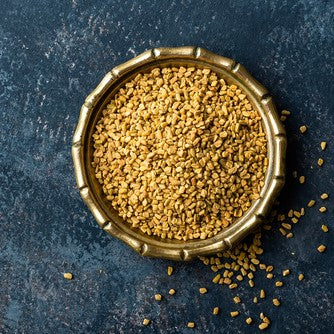Fenugreek Seeds: All the Health Benefits

Share
Fenugreek: Featured in our Biodynamic Inflammation Tonic
Fenugreek is an herb that is native to the Mediterranean region, southern Europe, and western Asia. It is one of the oldest medicinally used plants, with roots in both traditional Indian and Chinese systems of medicine. The fenugreek seeds are used in cooking and medicine, and the leaves are eaten in India as a vegetable. This wonderful herb has a long history of medicinal use and offers many incredible benefits.
People have been using fenugreek in varying forms for thousands of years to treat a very wide range of conditions, such as:
- Digestive problems, including constipation, loss of appetite, and gastritis
- Inflammation
- Arthritis
- Muscle pain
- Migraines and headaches
- Obesity
- Diabetes
- Ulcers
- High blood pressure
- Low testosterone or libido
- Painful menstruation
- Breastmilk production
Fenugreek Benefits
Some of the benefits of fenugreek have been verified by modern research. Quite a few studies in animals have shown that at least four compounds in fenugreek have antidiabetic properties. They primarily:
- reduce intestinal glucose absorption
- delay gastric emptying
- improve insulin sensitivity and action
- reduce concentrations of lipid-binding protein
In a 2017 study, mice fed a high-fat diet with 2 percent whole fenugreek seed supplementation for 16 weeks had better glucose tolerance than those who did not receive the supplementation.
Reduces inflammation
The substantial levels of antioxidants in fenugreek give it great potential as an anti-inflammatory agent. Results of a 2012 study in mice suggest that the high antioxidant flavonoid content in fenugreek seeds can reduce inflammation.
Reduces the risk of heart and blood pressure conditions
Fenugreek may help regulate cholesterol levels and improve blood pressure, which can reduce the risk of developing heart conditions and improve heart health. This may be because fenugreek seeds contain roughly 48 percent dietary fiber. Dietary fiber is very hard to digest, and it forms a viscous gel in the intestines that makes it harder to digest sugars and fats.
Helps with pain relief
Fenugreek has long been used for pain relief in traditional systems of medicine. Researchers think that compounds called alkaloids in the herb help block sensory receptors that allow the brain to perceive pain. In a 2014 study, 51 women with painful periods took capsules of fenugreek seed powder three times a day for the first 3 days of their periods for 2 consecutive months. They experienced shorter durations of pain and fewer symptoms between the months.
Improves milk production and flow
Fenugreek may help stimulate breast milk production and ease the flow. Practitioners of traditional Asian medicine have long recommended fenugreek for this purpose. In a 2014 study, 25 women who had recently given birth drank three cups of fenugreek tea daily for 2 weeks and saw an increase in milk volume in the first weeks.
Raises testosterone and boosts sperm count
Fenugreek may help increase low testosterone and sperm levels. In a 2017 study, 50 male volunteers took an extract of fenugreek seeds for 12 weeks. About 85 percent of the participants had an increased sperm count. The results also indicate that the extract consistently improved mental alertness, mood, and libido.
Helps to activate the curcumin compound in turmeric
Many people are becoming aware of the anti-inflammatory health benefits of turmeric. One of the things you will often read about turmeric is that it needs other herbs to activate the active compound curcumin, which is attributed to turmeric’s anti-inflammatory effects. Most often, black pepper is used to activate the curcumin compound. Fenugreek, however, works just as well for this purpose, and offers its own anti-inflammatory benefits alongside turmeric.
Precautions
Some people have had mild allergic reactions to fenugreek, although this is very rare. Pregnant women should avoid using fenugreek because it contains compounds that can stimulate contractions and may cause birth abnormalities. Fenugreek can also act similarly to estrogen in the body, so it may negatively impact people with hormone-sensitive.
Summary
People have used fenugreek leaves and seeds for hundreds of years to treat a wide variety of conditions. Many of fenugreek's uses have been verified by modern research, though there is still more research needed to verify the other traditional uses of this medicinal herb. Though taking fenugreek is generally safe for most people, very few people have had allergic reactions to the herb.
References:
https://www.sciencedirect.com/science/article/pii/S0278691512003043
https://www.ncbi.nlm.nih.gov/pmc/articles/PMC5630574/
https://www.ncbi.nlm.nih.gov/pmc/articles/PMC3955423/
https://www.ncbi.nlm.nih.gov/pmc/articles/PMC5278660/
https://www.ncbi.nlm.nih.gov/pmc/articles/PMC4525133/
https://www.ncbi.nlm.nih.gov/pmc/articles/PMC3918523/
https://www.sciencedirect.com/science/article/pii/S1756464612000059